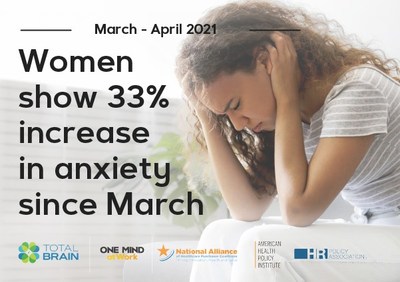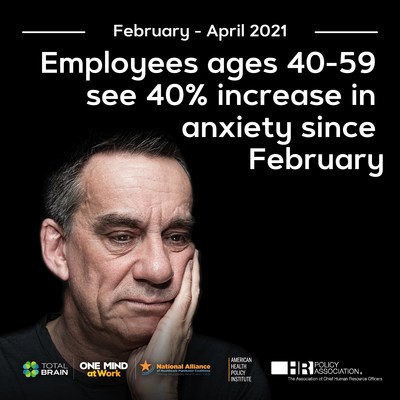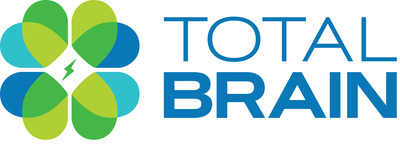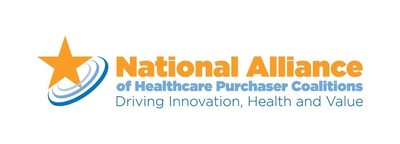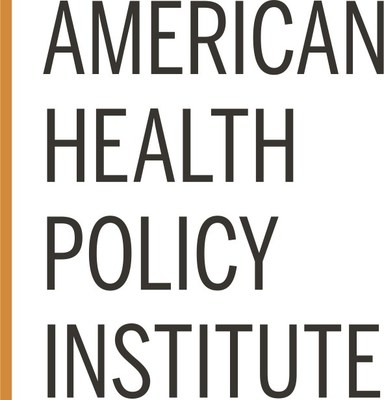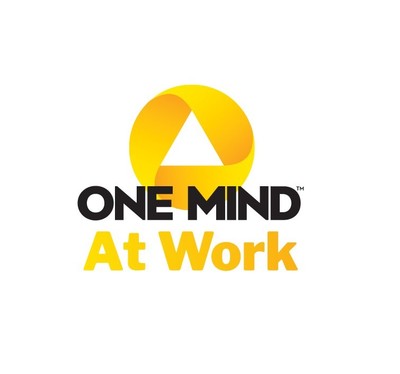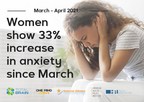
SAN FRANCISCO and WASHINGTON, May 20, 2021 /PRNewswire/ —
Key Mental Health Index Findings:
- Compared to March 2021, women are showing a 33% increase in feelings of anxiety, a 25% increase in stress, and a 23% increase in depressed mood.
- 40-59-year-old employees are showing a worrisome 40% increase in feelings of anxiety in just the past two months.
- The risk of PTSD is now up 29% since the end of February 2021 and is 46% higher than before the COVID-19 pandemic.
According to the latest Mental Health Index: U.S. Worker Edition, everyone’s mental health is worsening as the return to the workplace looms large. Stress, depressed mood, feelings of anxiety and risk of PTSD are on the rise once again. Most notable – the data signals an impending trend reversal among female employees, who had seen remarkable mental health improvements since January. Compared to March 2021, women are showing a 33% increase in feelings of anxiety, a 25% increase in stress, and a 23% increase in depressed mood.
Simultaneously, the growing anxiety and stress among 40-59-year-old employees, highlighted in last month’s Mental Health Index, continues to curve upward. This older cohort, which are often mid-level and senior leaders, are showing a worrisome 40% increase in feelings of anxiety in just the past two months.
PTSD is without bias when it comes to age and gender. While the past few months showed slight upticks in PTSD; the risk of PTSD is now up 29% since the end of February 2021 and is 46% higher than before the COVID-19 pandemic.
The Mental Health Index: U.S. Worker Edition, powered by Total Brain, a mental health and brain performance self-monitoring and self-care platform, is distributed in partnership with the National Alliance of Healthcare Purchaser Coalitions, One Mind at Work, and the HR Policy Association and its American Health Policy Institute.
“Business as usual is no more,” said Louis Gagnon, CEO, Total Brain. “The employees who have been working at make-shift kitchen table desks and bedrooms turned temporary offices are not the same employees who fled the workplace in March 2020. The mental health impacts of the past year will linger for some time and cannot be ignored. In fact, just the opposite is true. Workers want employers to help break the stigma of mental health struggles. They want a corporate culture that embraces open dialogue about mental health and an employer that provides a full-spectrum of mental health resources.”
These Mental Health Index findings were released on the heels of a new research report from Total Brain: Back to Work: How to Prepare for Five Mental Health Challenges Facing Returning Workers. The report was created based on an opinion survey of U.S. workers’ attitudes toward heading back to a familiar-yet-unfamiliar work environment. Key findings, which complement the Mental Health Index data and offer keen insights for employers seeking to open long-shuttered doors, include:
- Two-thirds of American workers say they feel somewhat or extremely anxious about returning to work.
- More than 20% of workers said they would feel better about returning to work if their employer increased access to mental health resources.
- Half of respondents said their employer has not done enough to address the mental impacts of COVID-19 on employees.
- Most (86%) want their employer to build a corporate culture that encourages open dialogue about mental health challenges.
Michael Thompson, National Alliance president and CEO, commented, “After more than a year of emotional stress and trauma, employers and employees will never be the same. As we get to the other side of the pandemic, we look forward with both hope and anxiety to a period of renewal, reconnection and reconstruction of our longer-term realities.”
“These findings make it abundantly clear that we need to ensure employers have access to the tools and resources necessary to support their employees’ mental health,” said Daryl Tol, executive vice president, One Mind at Work. “By creating informed, responsive and understanding workplaces, employers can affect real change in their employees’ lives.”
Colleen McHugh, executive vice president of the American Health Policy Institute and strategic advisor for HR Policy Association said, “American Health Policy Institute member companies are seeing the increased anxiety and symptoms of stress in employees, highlighted in this latest study. As a result, these large employers have been developing new ways to more smoothly and mindfully transition employees who are returning back to the workplace, while also pioneering new benefit offerings to improve the overall behavioral and mental health of all employees.”
The full Mental Health Index results can be found here. For additional insights there will be a complimentary 30-minute webinar on Friday, May 21 at 12 p.m. Eastern. Register here: https://zoom.us/webinar/register/WN_InKxTvGyR06EdzbBse7F9g
For more information, Mental Health in the COVID-19 Era: A Year in Review provides a month-by-month overview of the Mental Health Index data juxtaposed against the state of COVID-19 in the U.S. and around the world. This report covers how COVID-19 has affected the mental health of U.S. employees over the past 12 months, including everything from job security and safety to changes at home and events in the news.
Methodology: The Mental Health Index: U.S. Worker Edition contains data drawn from a weekly randomized sample of 500 working Americans taken from a larger universe of Total Brain users. The Index is NOT a survey or a poll. Data is culled from neuroscientific brain assessments using standardized digital tasks and questions from the Total Brain platform. Participants include workers from all walks of life and regions, job levels, occupations, industries, and types of organizations (public vs. private). The brain assessments used to compile the latest Mental Health Index were taken weekly from March 15 to May 2, 2021.
About Total Brain: Total Brain is based in San Francisco and publicly listed in Sydney, AUS (ASX:TTB). Total Brain is a mental health and brain performance self-monitoring and self-care platform that has 1M registered users. Benefits for employers and payers include better mental healthcare access, lower costs and higher productivity. totalbrain.com
About the National Alliance: The National Alliance of Healthcare Purchaser Coalitions (National Alliance) is the only nonprofit, purchaser-led organization with a national and regional structure dedicated to driving health and healthcare value across the country. Its members represent private and public sector, nonprofit, and Taft-Hartley organizations, and more than 45 million Americans spending over $300 billion annually on healthcare. nationalalliancehealth.org
About One Mind: One Mind at Work. Launched in 2017, One Mind at Work is a global coalition of leaders from diverse sectors who have joined together with the goal of transforming approaches to mental health and addiction. One Mind at Work now includes more than 90 global employers and 18 research and content partners. The coalition covers more than 8 million people under its charter. onemindatwork.org
HR Policy Association: HR Policy Association is the lead organization representing Chief Human Resource Officers at major employers. The Association consists of over 390 of the largest corporations doing business in the United States and globally, and these employers are represented in the organization by their most senior human resource executive. Collectively, their companies employ more than 10 million employees in the United States, over nine percent of the private sector workforce, and 20 million employees worldwide. These senior corporate officers participate in the Association because of their commitment to improving the direction of human resource policy. hrpolicy.org.
American Health Policy Institute: American Health Policy Institute is a non-partisan non-profit think tank, started by the HR Policy Foundation, that examines the practical implications of health policy changes through the lens of large employers. The Institute examines the challenges employers face in providing health care to their employees and recommends policy solutions to promote the provision of affordable, high-quality, employer-based health care. The Institute serves to provide thought leadership grounded in the practical experience of America’s largest employers. Their mission is to develop impactful strategies to ensure that those purchasing health care are able to not only bend the cost curve, but actually break it, by keeping health care cost inflation in line with general inflation. americanhealthpolicy.org.
|
For More Information Contact: |
Kelly Faville, Rocket Social Impact |
|
978-621-6667 |
![]() View original content to download multimedia:http://www.prnewswire.com/news-releases/according-to-the-mental-health-index-everyones-mental-health-is-worsening-as-return-to-the-workplace-looms-large-301295566.html
View original content to download multimedia:http://www.prnewswire.com/news-releases/according-to-the-mental-health-index-everyones-mental-health-is-worsening-as-return-to-the-workplace-looms-large-301295566.html
SOURCE Total Brain


